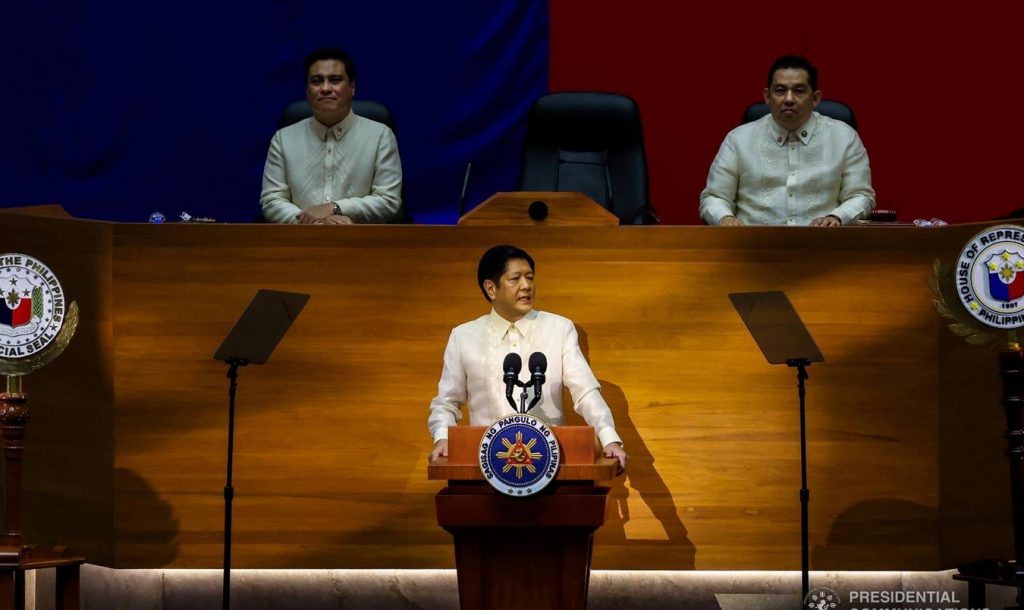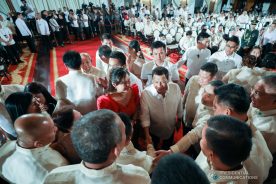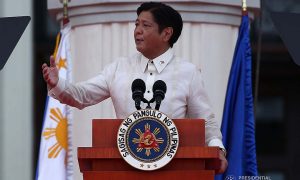Recently, the Commission on the Filipino Language (Komisyon sa Wikang Filipino, or KWF) released a memorandum banning five books from public schools and libraries. The signatories of this memo, KWF commissioners Carmelita Abdurahman and Benjamin Mendillo, deemed these works subversive, anti-Marcos, anti-Duterte, and in violation of Article 9 of the Anti-Terrorism Act of 2020. Along with three more commissioners, they then attacked the chairman of the KWF, Arthur Casanova, for authorising the publication of these books.
This ban has since received sharp criticism from academics, legislators, and other government bodies—many of who considered it as repressive authoritarianism rearing its ugly head. Nevertheless, when analysed in relation to President Ferdinand “Bongbong” Marcos Jr.’s current brand of “Unity”, this controversial book ban points to a more subtle yet equally dangerous challenge against liberal, democratic, and progressive forces in the Philippines.
What is this subtle danger I am referring to?
Looking at Marcos Jr.’s inaugural and first State of the Nation addresses, he has projected an anti-political ideal characterised by a seemingly benign focus on government work. This was amplified by his relative silence on controversial political issues like historical distortion and human rights violations. Furthermore, by analysing the psychology of political intolerance, it is probable that these two major speeches have tapped pre-existing anti-political sentiments among Filipinos.
Before proceeding, let us first clarify the meaning of anti-political. Between Chantal Mouffe and Hannah Arendt, the anti-political refers to the realisation of political intolerance by attacking or dismissing political plurality as a threat to a monolithic ideal like unity. Consequently, this necessitates control over political discourse. This can range from aggressive acts like outright repression to more subtle ones like asserting the primacy of loyalty to a regime over dissent and opposition. Another subtle mechanism of control is closing down or devaluing political discussions for the sake of decisive government action, as if those two are in opposition.
These subtle means of controlling political discourse are contained in Marcos Jr.’s recent rhetoric. Consequently, his message resonates with his constituents even without denunciations that are typical of his predecessor Rodrigo Duterte.
Overall, between pervasive political intolerance among Filipinos and Marcos Jr.’s two major speeches lies the anti-political. It is characterised by a seemingly benign focus on public administration tied to a rejection of dissent that is deemed as either divisive, and/or disloyal to the incumbent regime.
Just Work, No Politics: A Subtle Call for Unity against Dissent
In his inauguration address, Bongbong Marcos re-asserted his call for unity—stating that by “your vote, you rejected the politics of division”. He then proceeded to absorb the platforms of his opponents, saying that “I saw little incompatibility with my own ideas about jobs, fair wages, personal safety and national strength and ending want in a land of plenty”. As a whole, his message of hope and recovery is premised upon this condemnation of a supposed “politics of division”.
But what is this politics of division?
Marcos Jr.’s own elaboration points to mudslinging, stating that “I offended none of my rivals in this campaign”. However, for the politically intolerant among his supporters, this politics of division could easily refer to opposition itself. This is because the intolerant see differing ideas as a threat to social harmony, more so for dissent itself. Manifesting itself in pejorative stereotypes like “mareklamo” (translatable to peevish) and “panay reklamo” (translatable to perpetually dissatisfied), the intolerant consider public displays of opposition or dissent as a nuisance, a disruption to peace and order, or even a threat to government work.
Furthermore, Marcos Jr.’s rejection of this politics of division must be understood in relation to both widespread political intolerance among Filipinos, and anti-leftists and anti-communists forces in the Philippines who have grown both more vocal since Duterte’s break from his leftist ties, and audacious enough to start banning books. The resurgence of “red-tagging”, and the persistent violent persecution of suspected members of the communist insurgency, serve as practical manifestations of such an association between political divisiveness and opposition. Simply put, between Bongbong Marcos’ speech, and political intolerance among Filipinos, this politics of division can easily refer to all forms of dissent against the incumbent regime.
Discipline and Democracy: Political Speech and Leader-Centrism
Insights from the perspective of the middle class also suggest that Marcos Jr.’s message might have resonated with a shared desire to “discipline” democracy itself. Specifically, sociologist Marco Garrido notes the disdain of the middle classes against a supposedly unruly lower classes and populist policies coddling them. Along with the need for a strong and even bloody-handed leader, “disciplining democracy”, Garrido observes, appears to be the middle classes’ attempt to re-assert the importance of political order. Extending this insight, I posit that Marcos Jr.’s message of unity against this politics of division places the freedoms of speech and organisation in an awkward and dangerous position.
Between unity and political intolerance, public expressions are being compelled to subscribe to the incumbent regime—to the trinity of leader-nation-state as leader-centric tendencies dictate. This opens up the possibility that repression will be juxtaposed with expressions of loyal dissent—a simulation of “free” speech. An example has already occurred last June with a protest against the appointment of Susan Ople as secretary for migrant workers. A pro-Marcos group of supposed migrant workers publicly rejected Ople’s appointment because of her health condition as a breast cancer survivor. Marcos has re-affirmed her appointment, thus, silencing critics. The peaceful resolution of this issue complements police officials’ attempts to keep the venue of Marcos Jr.’s inauguration exclusive to pro-Marcos “protesters”. This stands in stark contrast to how water cannons were used against anti-Duterte-Marcos protesters back in May 2022. From these incidents we can ask, where is the line drawn?
Drawing the Line through Silence
Marcos’ first SONA was marked by what it ignored. Marcos avoided addressing the main criticisms that the opposition has levelled against his ascent to the presidency. Consequently, problems like historical distortion and human rights violations appear to be non-issues for his administration at this point.
Duterte’s Tight Grip over Local Politicians: Can It Endure?
If Duterte has failed to deliver, why do so many local politicians remain beholden to him?
What I emphasise is that these two issues, are directly linked to the legitimacy of his regime and that of his predecessors, Marcos Sr. and Duterte. For one, the issue of historical distortion is directed at the credibility of claims made on the supposed greatness of Marcos Sr. —claims that have served in no small part as a foundation for the younger Marcos’ own legitimacy. The issue of human rights violation is directly linked to the atrocities committed under his father’s Martial Law and the Drug War under Duterte. It thus appears that Marcos Jr. draws the line on issues that are directly connected with the legitimacy of his administration, which is at this point is still largely founded on the narratives supporting his father’s legacies.
This line is in itself, unsurprising. What I highlight is that his silence on these issues speaks louder than words. As annoyingly cliché as it is, this rings true for his first SONA. This is because there is a lack of re-affirming guarantees for certain political rights when such are necessary under difficult times. Like his call for unity, Bongbong Marcos’ silence on such controversial issues is juxtaposed with the presence of reactionary forces within and outside the government. These include both the National Task Force to End Local Communist Armed Conflict (NTF-ELCAC), and anti-communist/anti-leftist civilian groups demanding crackdowns on legal left organizations. In other words, under conditions of persistent persecution and infighting among citizens in public spaces, failure to re-affirm political rights is an implicit call for an open season against dissent and opposition.
Anti-Political Unity
Between the political intolerance among Filipinos and Marcos Jr.’s two major speeches lies the anti-political. It is cloaked by a seemingly benign focus on public administration tied to a devaluation and rejection of public expressions of dissent. Opposition becomes taboo – a manifestation of divisive politics and disloyalty to the leader-nation-state.
To elaborate, we must recognise that politics is a concept whose ancient simplicity is replaced by the burdens of human history itself. It is saddled with so much semantic baggage that even if it still refers to an activity in common parlance, another term is brought forth to help carry excess meaning. “Pamumulitika” (politicking or political gimmicks) and “Pinulitika” (roughly translated as politicised) for Filipinos refer to everything dirty, underhanded, and unjust in public affairs. Marcos Jr.’s subtle attack against a politics of division amplifies another dimension of pamumulitika, namely conflating opposition with divisiveness. This could explain why some prominent leftist groups failed to gain a seat in Congress during the 2022 elections. It could also labelled as divisive.
Furthermore, it appears that anti-political tendencies among Filipinos posit an anti-democratic ideal wherein the commands of a leader—his policies, priorities, and pronouncements—serve as the only valid frame for good politics. Consequently, debates, disagreements, and dissent should be anchored on absolute loyalty to the trinity of the leader-nation-state. Hence, among the politically intolerant with dreams of monolithic unification, dissent without an expression of loyalty and obedience to the aforementioned triad are dubbed as mere pamumulitika or politicking.
The depth and extent of such tendencies among ordinary Filipinos worth future inquiries. Here, I posit the real possibility that the Philippines is descending into an anti-political nightmare, wherein plurality and dissent are rejected, repressed, or worse, made subject to expressions of loyalty to the chief.
We must remember that Marcos the Younger’s pernicious anti-politics, veiled by both his rhetoric of unity and silence on controversial political issues, has resonated with many Filipinos. The problem is not only with the apparent rationale of his government—a government driven by an implicit dictum of “only work, no politics.” It is also about the shared ideals of a people whose life under a dysfunctional system has rendered them incapable of seeing themselves as an effective part of politics.
Thus, it appears that while they might detest politics as something that both affects and excludes them, they also want a government of action. And for this reason, they are willing to sacrifice contentious political discussions, and comply with the anti-political rationale of the current regime.
 Facebook
Facebook  Twitter
Twitter  Soundcloud
Soundcloud  Youtube
Youtube  Rss
Rss 



